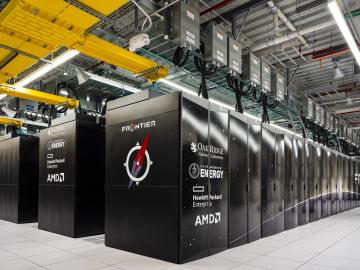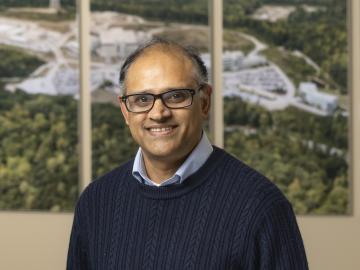
Filter News
Area of Research
News Topics
- (-) 3-D Printing/Advanced Manufacturing (20)
- (-) Big Data (10)
- (-) Energy Storage (21)
- (-) Exascale Computing (15)
- (-) Frontier (19)
- (-) Machine Learning (15)
- (-) Nanotechnology (7)
- (-) Quantum Science (9)
- (-) Software (1)
- Advanced Reactors (3)
- Artificial Intelligence (26)
- Bioenergy (22)
- Biology (29)
- Biomedical (7)
- Biotechnology (6)
- Buildings (14)
- Chemical Sciences (24)
- Clean Water (5)
- Composites (6)
- Computer Science (23)
- Coronavirus (4)
- Critical Materials (6)
- Cybersecurity (9)
- Education (3)
- Emergency (1)
- Environment (43)
- Fossil Energy (2)
- Fusion (9)
- Grid (16)
- High-Performance Computing (33)
- Hydropower (3)
- Irradiation (2)
- Isotopes (11)
- Materials (59)
- Materials Science (16)
- Mathematics (2)
- Mercury (2)
- Microelectronics (2)
- Microscopy (7)
- Molten Salt (1)
- National Security (21)
- Neutron Science (32)
- Nuclear Energy (21)
- Partnerships (24)
- Physics (14)
- Polymers (4)
- Quantum Computing (12)
- Security (3)
- Simulation (29)
- Space Exploration (4)
- Summit (9)
- Transportation (18)
Media Contacts

To support the development of a revolutionary new open fan engine architecture for the future of flight, GE Aerospace has run simulations using the world’s fastest supercomputer capable of crunching data in excess of exascale speed, or more than a quintillion calculations per second.

Innovations in artificial intelligence are rapidly shaping our world, from virtual assistants and chatbots to self-driving cars and automated manufacturing.

For more than 100 years, Magotteaux has provided grinding materials and castings for the mining, cement and aggregates industries. The company, based in Belgium, began its international expansion in 1968. Its second international plant has been a critical part of the Pulaski, Tennessee, economy since 1972.

ORNL scientists found that a small tweak created big performance improvements in a type of solid-state battery, a technology considered vital to broader electric vehicle adoption.

Having passed the midpoint of his career, physicist Mali Balasubramanian was part of a tight-knit team at a premier research facility for X-ray spectroscopy. But then another position opened, at ORNL— one that would take him in a new direction.

Rigoberto Advincula, a renowned scientist at ORNL and professor of Chemical and Biomolecular Engineering at the University of Tennessee, has won the Netzsch North American Thermal Analysis Society Fellows Award for 2023.
For the third year in a row, the Quantum Science Center held its signature workforce development event: a comprehensive summer school for students and early-career scientists designed to facilitate conversations and hands-on activities related to

Lawrence Livermore National Laboratory’s Lori Diachin will take over as director of the Department of Energy’s Exascale Computing Project on June 1, guiding the successful, multi-institutional high-performance computing effort through its final stages.

When reading the novel Jurassic Park as a teenager, Jerry Parks found the passages about gene sequencing and supercomputers fascinating, but never imagined he might someday pursue such futuristic-sounding science.

A study led by researchers at ORNL could uncover new ways to produce more powerful, longer-lasting batteries and memory devices.


